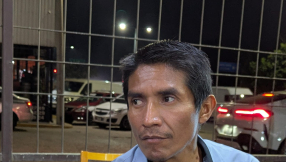An Episcopal church in California in the US has stated it will not pray for Donald Trump by name.
This is because the name of Trump is considered to be a "trauma trigger" - and a risk to health and safety.
It is traditional in Anglican churches worldwide to pray for a nation's leaders. Church of England parishes regularly pray for the Queen and Episcopal churches in the US pray for the President and the Government.
"We are in a unique situation in my lifetime where we have a president elect whose name is literally a trauma trigger to some people – particularly women and people who, because of his words and actions, he represents an active danger to health and safety, says Mike Kinman, Rector of All Saints Pasadena in his blog.
He defends the Trump name boycott as justified because his church must be kept as "a place of safety from harm".
He says: "As I have said before, for some it could be as if we demanded a battered woman pray for her abuser by name. It's not that the abuser doesn't need prayer – certainly the opposite – but prayer should never be a trauma-causing act."
In common with other churches, the congregation at All Saints has traditionally prayed for those in positions of authority.
"As Episcopalians, we pray for our leaders. It's one of those things we do," admits Kinman.
And All Saints has usually mentioned these leaders by name.
No more will that be the case.
Kinman goes on: "If you come to All Saints this Sunday, you'll notice that we have removed the proper names from our prayers for those in authority. Whereas before we prayed for 'Barack, our president', we are now praying for 'our president, our president-elect, and all others in authority.' This practice will continue for at least the near future."
He also says: "We pray for our leaders because they are human beings, made in God's image, and beloved by God. We pray for our leaders because leadership is important – because it is a sacred trust, power to be exercised for the common good despite all temptation to the otherwise.
"We pray for our leaders regardless of whether or not we like or agree with them. Our prayers are neither endorsement nor censure. Our prayers ask God to guard and guide, to bring out in our leaders what we hope God brings out in us all – the image of God that dwells in each one of us."
Earlier, The Episcopal Church's Presiding Bishop, Michael Curry, defended prayers for Donald Trump.
The Washington National Cathedral is hosting the Inaugural Prayer Service and the choir of the National Cathedral in Washington is among the performers at the Inauguration.
Curry, raised in a black congregation in the Episcopal Church, said they often prayed for leaders who were often lukewarm or even opposed to black civil rights.
He said: "Underneath the variety of questions and concerns are some basic Christian questions about prayer: when I pray for our leaders, why am I doing so? Should I pray for a leader I disagree with? When I pray what do I think I am accomplishing?"
He asks: "So, should we pray for the President?"
Christians must pray for all who lead in civic order, nationally and internationally.
"I pray for the President in part because Jesus Christ is my Savior and Lord. If Jesus is my Lord and the model and guide for my life, his way must be my way, however difficult. And the way prayer for others is a part of how I follow the way of Jesus," he wrote.
He cited Psalm 72 - which prays that the ancient Israelite king might rule in the ways of God's justice, defending "the cause of the poor," bringing "deliverance to the needy." In addition, 1 Timothy 2:1-2 encourages followers of Jesus to pray earnestly for those in leadership, that they may lead in ways that serve the common good.
Jesus himself said, while dying on the cross, "Father forgive them; for they do not know what they are doing." He was praying for Pontius Pilate, the Governor of Rome who ordered his execution, and for all who were complicit in it, said Curry.













